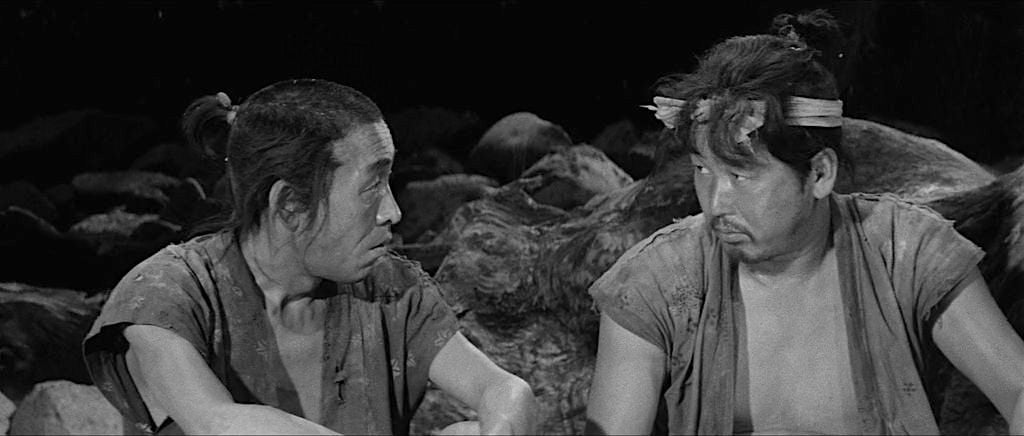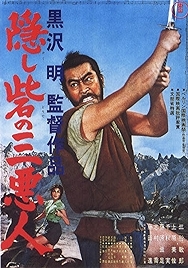The Hidden Fortress is a film by Akira Kurosawa and just that fact alone – “a film by Akira Kurosawa” – is enough to get it bracketed as an arthouse movie. Which is entirely ridiculous if you watch it, because there’s nothing difficult or abstruse going on here, no philosophical musing, no challenging style experiments to overcome or difficulties over character, plot or chronology.
It’s an out and out Saturday evening adventure movie with action, comedy, a pretty girl and a strapping hero. It’s that aspect of it, its entertainment value, that first attracted George Lucas to it when he was first scoping out his first Star Wars film. Great though Star Wars is, an arthouse movie it is not.
There are other similarities with Lucas’s film, though the whole “it’s based on The Hidden Fortress” argument takes things too far. This is a quest movie, there is an endangered princess and in its lead characters, venal, cowardly peasants Tahei (Minoru Chiaki) and Matashichi (Kamatari Fujiwara) there are obvious templates for joined-at-the-hip robots R2D2 and C3PO. Princess Yuki (Misa Uehara) is also an obvious role model for Princess Leia – feisty, brave, combat-ready and also struggling against enemy forces who would extinguish her blood line and with it the hopes of a lot of innocent people.
John Williams clearly listened to Masaru Satô’s soundtrack, though not as closely as Ennio Morricone did with Satô’s soundtrack to Kurosawa’s Yojimbo when he was scoring Sergio Leone’s remake A Fistful of Dollars.
But… no Darth Vader, no Luke Skywalker, no Han Solo, or anyone who might fit that bill. Instead there is Toshirô Mifune as legendary General Makabe. You could argue that Makabe is a composite: Obi Wan’s wisdom, Han Solo’s charm and swagger, but that is to put the cart before the horse. Getting our chronologies in the right order, Mifune is obviously modelled on Douglas Fairbanks, down to the fists-on-hips stance and the head thrown back in uproarious laughter.
For full enjoyment it’s actually best to leave the Star Wars comparisons to one side once those obvious borrowings have been taken into account, and follow Tahei, Matashichi, Princess Yuki and General Makabe on a grand adventure to spirit the princess and a hoard of gold across enemy lines, the first two doing it for the money, the second two for more noble reasons.
Kurosawa is a master of action. His crowd scenes are brilliantly choreographed (watch an entire platoon of soldiers flinch as one) and he’s also a dab hand at the action set piece – spears and samurai swords might not be light sabres but isn’t the way they are wielded incredibly familiar? Sorry, I’m comparing again.
Everyone overacts, which is to say they bark their (post-dubbed) lines, strike fierce poses and roll their eyes in the theatrical Japanese style whenever possible. Once you’ve tuned in to the idea – overdoing it – it’s all great fun. Join in at home.
Mifune was Kurosawa’s favourite actor and you can see why here. He exudes manliness, charm and natural authority and he’s the sort of person who can jump onto a horse and gallop off, samurai sword aloft, motionlessly ready to strike while the horse thunders away beneath.
Some of the Japanese notions of martial honour – we’re only alive when we fight and it’s better to die than to be allowed to live after losing – don’t quite map to the current zeitgeist, but on the whole this is a remarkably familiar sort of film, with incident, jeopardy, comedy and action all crowding in on each other like something from the Marvel Cinematic Universe.
Enjoy with pizza and a beer in other words. As for the subtitles – given that you’re reading these words they shouldn’t be too taxing.
PS: a word about the Criterion 2K restoration I watched. It’s spectacular. Not only is the image sharp and the monochrome shades incredibly nuanced, but it’s been resubtitled, and brilliantly, in a way that’s both up to date but unobtrusive. No one ever said “Get out of here,” in 1958 to mean “I don’t believe you,” but they do here. It fits the whole knockabout ethos perfectly.
The Hidden Fortress – Watch it/buy it at Amazon
I am an Amazon affiliate
© Steve Morrissey 2021


